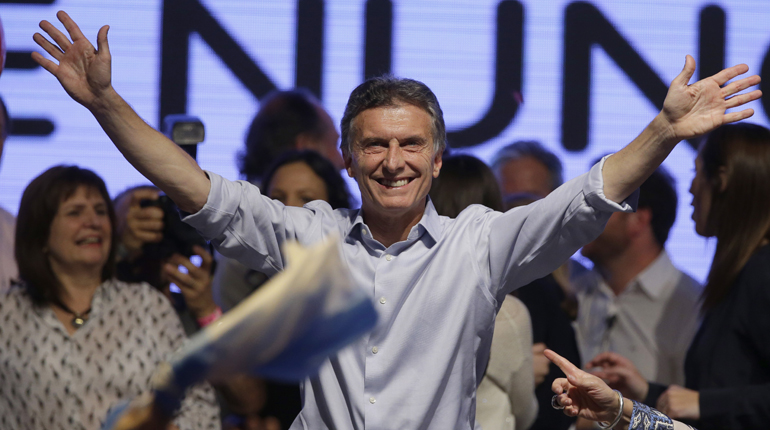
It will take time to properly assess the international consequences of Maurício Macri’s victory in Argentina’s presidential elections. Some analysts predict the end of the era of left-wing commodity-fueled populist governments in the region (possible, though somewhat simplistic); others point to the stronger likelihood of a trade agreement between Mercosur and the European Union (probably correct). The most immediate impact in the international realm, however, will be felt in the discussion about how the region will deal with the democratic crisis in Venezuela, where parliamentary elections will take place on December 6. Overnight, Argentina has turned from Venezuela’s greatest supporter (who often protected Caracas from being condemned openly) into its greatest critic.
Even though Macri will only take charge four days after the elections in Venezuela, the president-elect has already signaled that he will push for the invocation of Mercosur’s democratic clause unless the elections in Venezuela are free and fair and unless political opposition leaders are released from prison. That is unlikely, considering that the Maduro government has actively worked against the presence of international observers for months. Even the Carter Center, hardly a paragon of anti-chavismo, has left Venezuela, citing ever harsher restrictions on its work. In a diplomatic affront in late October, Venezuela blocked Brazil’s Special Envoy Nelson Jobim, tasked with monitoring the elections as part of a UNASUR delegation. With ample evidence of limitations of free speech, imprisoned politicians and a President that has been ambiguous about whether he will accept an unfavorable election result, the absence of credible international observers is an indictment of efforts to defend human rights and democracy in South America.
After several years of remarkable silence by governments in Brasília, Buenos Aires and other capitals in the region about the systematic human rights abuses in Venezuela, Macri’s change of tone is likely to substantially alter the discussion. Invoking the democratic clause requires a unanimous vote and may thus fail due to Brasília’s resistance, but Argentina will no longer be the only one to openly criticize human rights abuses in Venezuela. The Chilean Supreme Court said Chile should take Venezuela to the Interamerican Human Rights Commission. The Brazilian Electoral Commission (TSE) decided not to participate in UNASUR’s electoral observer mission, citing the Venezuelan government’s uncooperative stance. A Venezuelan businessman taken into custody in Brazil may not be extradited as Brazil’s Supreme Court deliberates whether he can expect a fair trial at home. Uruguay’s President Vázquez said he would “study” Macri’s proposal. These are all growing signs of Venezuela’s growing international isolation. If the tide turned, Rousseff, internationally weak due to internal political and economic uncertainty at home, would be reluctant to be branded as Maduro’s sole protector.
Irrespective of whether one agrees with Macri’s economic ideas, his election is good news for those who seek to revive the debate about defending democracy in South America, which has turned into the region’s eyesore over the past years. The question of whether to invoke the democratic clause should be assessed calmly by governments in the region. The mere specter of the invocation — a sign that there is no longer consensus about turning a blind eye on Maduro’s excesses — may help the December 6 elections be more transparent. UNASUR and Mercosur can only have a meaningful impact on strengthening democracy if leaders in the region clarify that evidence of government interference in the electoral process will lead to a unified response, possibly leading to the country’s suspension of both organizations — as happened with Paraguay in 2012.
Sadly, arguments such as the ones made above are too often seen through an ideologized left vs. right lens. Yet regional bodies can only function properly if they can act as credible and legitimate mediators for both government and the opposition. Just like Maduro deserves to be criticized for failing to respect the judiciary’s independence, opposition figures who openly incite violence need to be punished. Neither the Venezuelan government nor several opposition leaders have always played by the rules. It must be the region’s goal to protect democracy, not the victory of any particular faction. Yet considering how badly political leaders in the region have failed to rein in the Venezuelan President until now, discussing the invocation of the democracy clause is the right step to show that they are serious about protecting democratic rule on the continent.
Read also:
The Politics of China’s Amazonian Railway
Curso de Férias: The Brazilian Crisis in Global Context
Photo credit: Press Association








